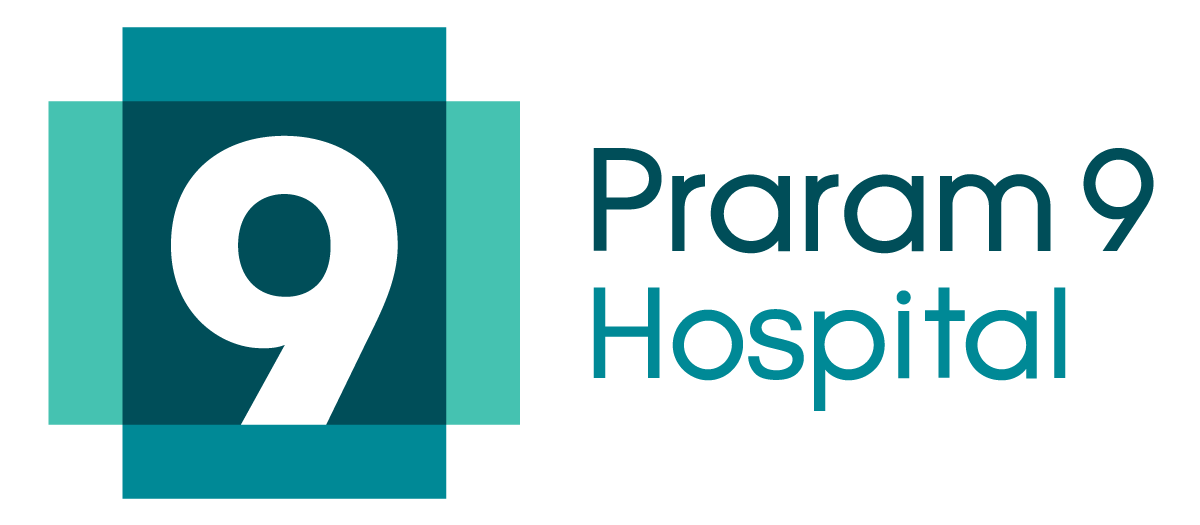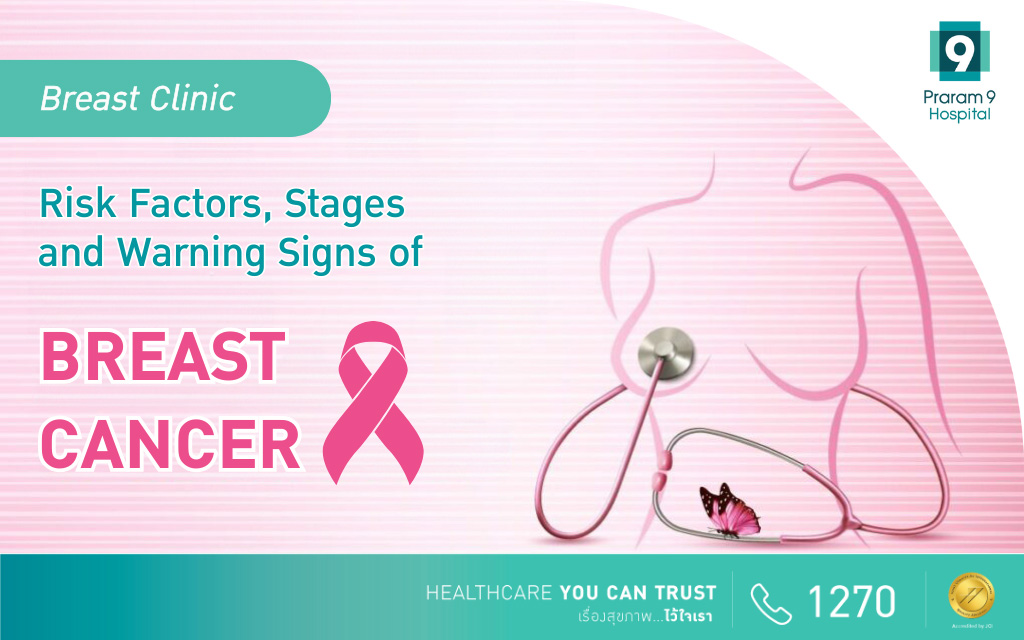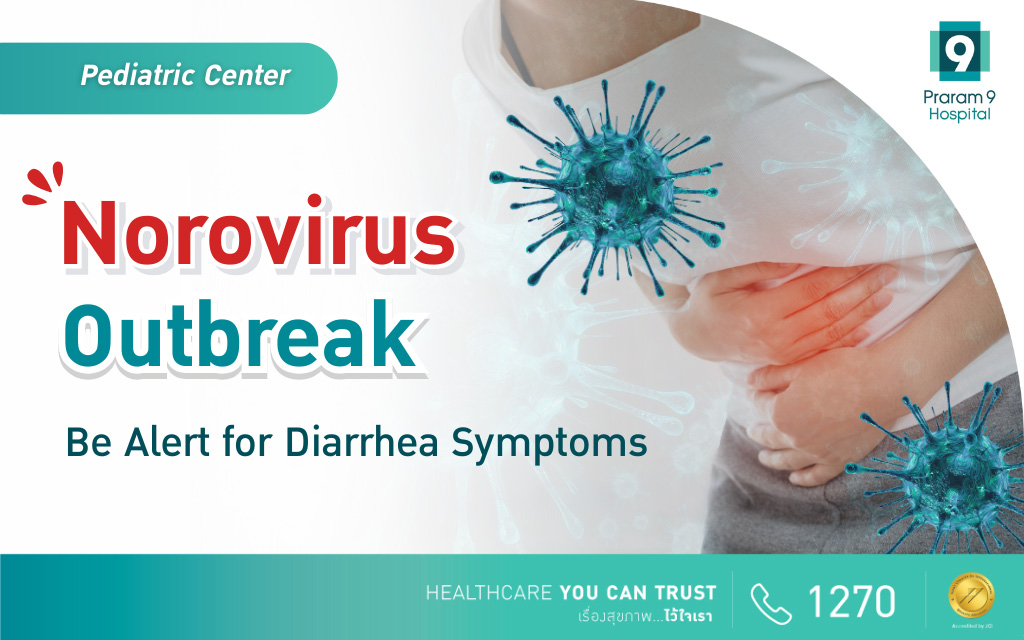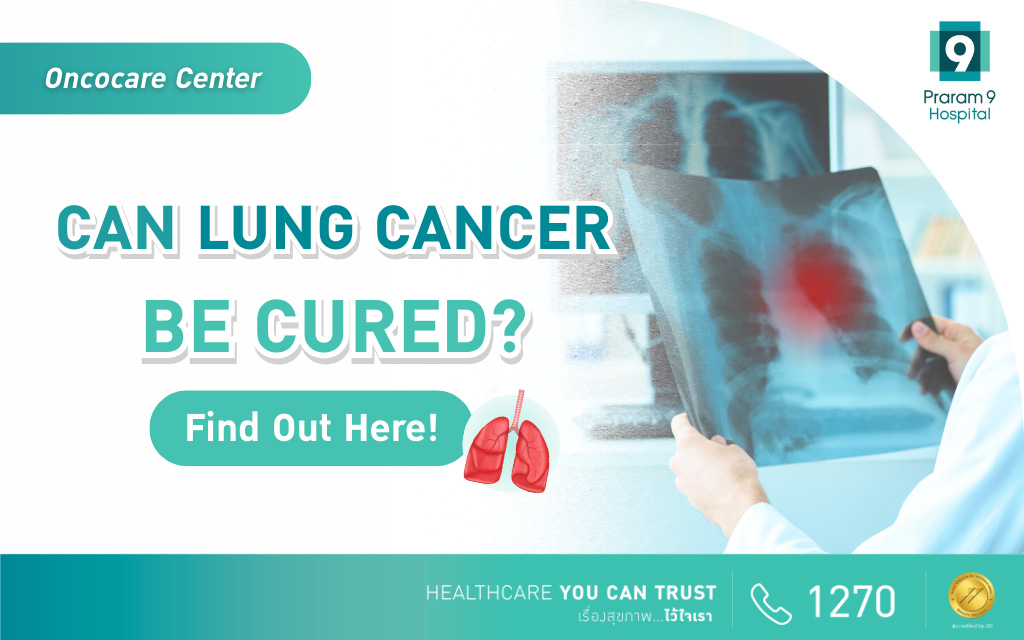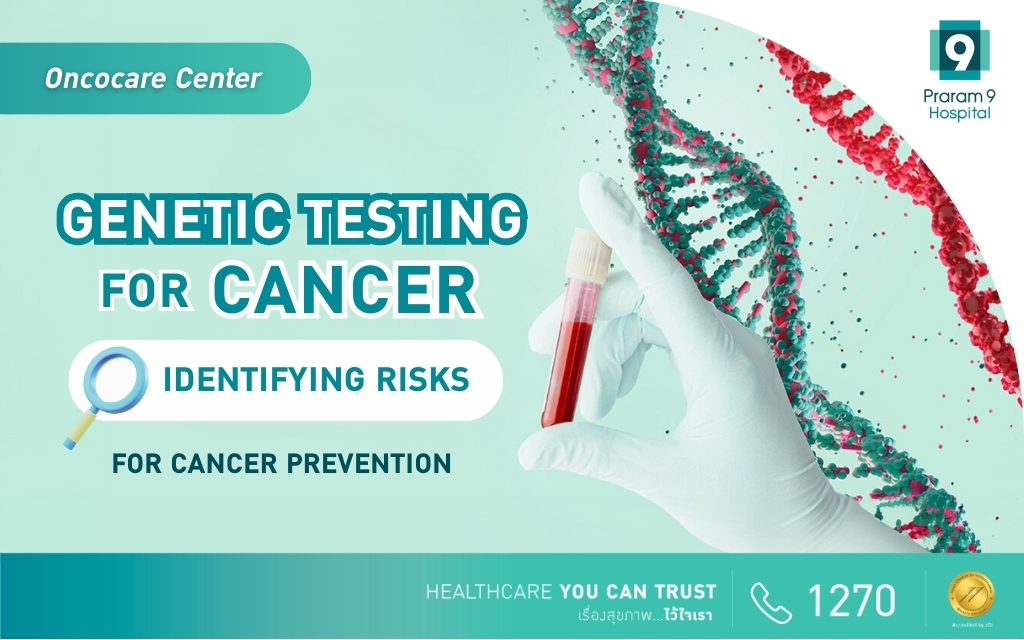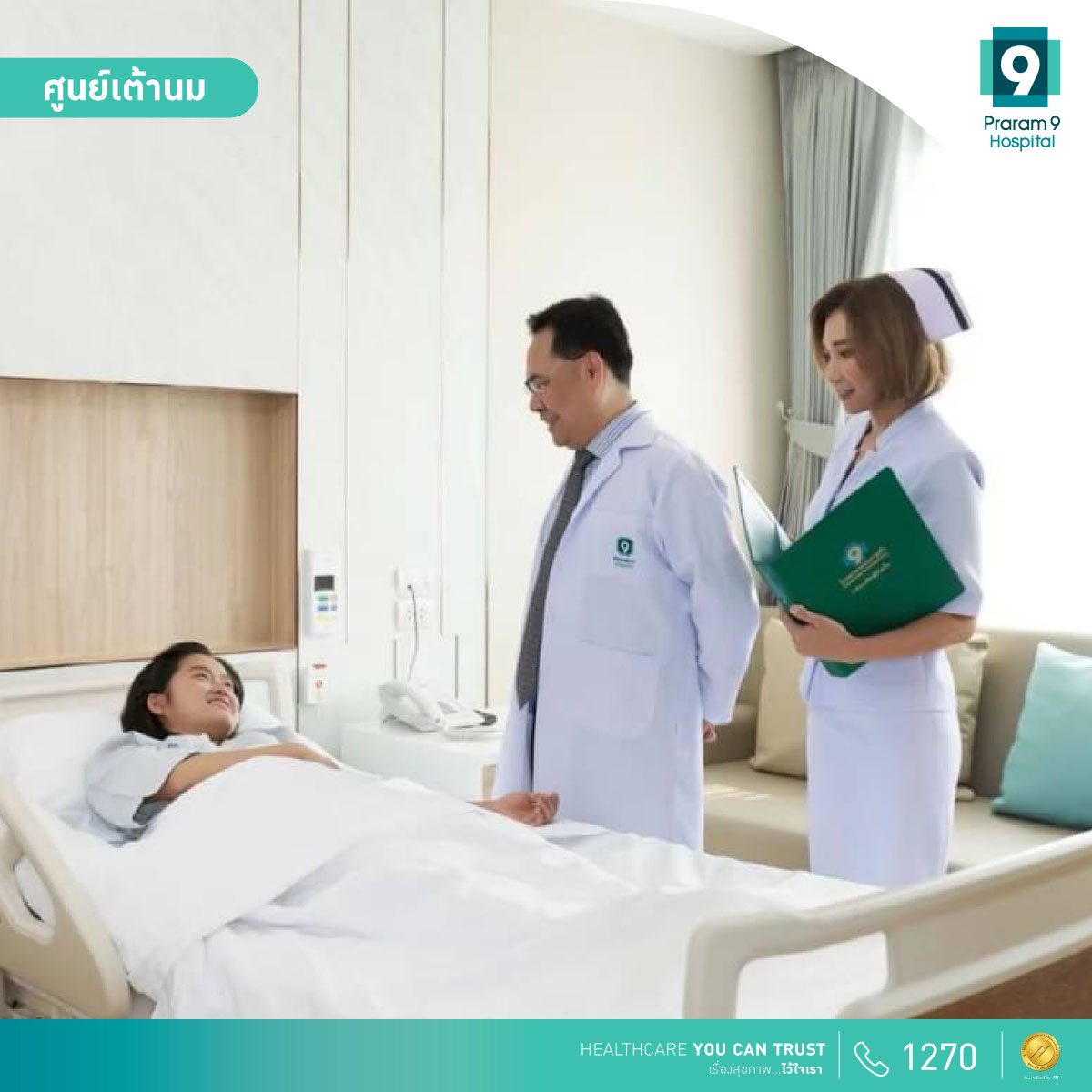Breast cancer ranks as the most common cancer in Thai women as well as women worldwide. Though breast cancer primarily affects women, it can also occur in men. Despite how frightening it may sound, medical research confirms that early detection of breast cancer significantly improves treatment outcomes.
Thus, understanding breast cancer is crucial for being aware of the risks and making timely decisions regarding treatment.
Table of contents
- What is Breast Cancer?
- What Causes Breast Cancer?
- 12 Risk Factors Related to Breast Cancer
- Warning Signs of Breast Cancer: What Are the Symptoms?
- Stages of Breast Cancer
- Breast Cancer Prevention Guidelines
- How Do Doctors Diagnose Breast Cancer?
- Breast Cancer Treatment Guidelines
- Breast-Conserving Surgery and Breast Reconstruction
- Conclusion
What is Breast Cancer?
Breast cancer occurs due to abnormal growth of cells in the breast, particularly in the milk ducts. These cells begin to divide uncontrollably and may spread to surrounding tissues. If left untreated, the cancer can metastasize to other parts of the body via the lymphatic system.
What Causes Breast Cancer?
Breast cancer typically arises from abnormal cells in the milk ducts, accounting for about 80% of cases. A smaller proportion, approximately 10%, originates from the abnormal growth of cells in the milk glands.
Additionally, breast cancer may spread from other organs to the breast.
12 Risk Factors Associated with Breast Cancer
Currently, there is ongoing debate regarding the exact risk factors that cause breast cancer. However, several factors have been confirmed to influence the likelihood of developing breast cancer, both positively and negatively:
- Gender: Women are 100 times more likely to develop breast cancer than men.
- Ethnicity: Western women are at higher risk compared to Asian women.
- Childbearing and Breastfeeding: Studies have shown that women who have children and breastfeed reduce their risk of breast cancer. On the other hand, those who have no children, are infertile, use birth control pills, or do not breastfeed have a higher risk.
- Sex Hormones: Early menstruation (before age 12) or late menopause (after age 55) means a woman’s body is exposed to estrogen and progesterone for a longer period, increasing the risk of breast cancer.
- Age: As age increases, the likelihood of genetic abnormalities in cells increases, which may lead to cancer.
- Women under 45 have about a 1 in 8 chance of developing breast cancer.
- Women over 55 account for about two-thirds of breast cancer cases.
- Obesity: Being overweight or obese increases the risk of breast cancer.
- Dense Breasts: Having dense breasts—meaning more glandular and connective tissue than fatty tissue—raises the risk of breast cancer. Additionally, dense breast tissue makes it more difficult for doctors to detect cancer through mammograms.
Note: Dense breasts cannot be determined by feel; only a doctor can diagnose it through a mammogram. - History of Breast Conditions: Women who have previously had breast abnormalities or undergone radiation treatment to the chest are at higher risk.
- Genetics: A family history of breast cancer, especially if it affects close relatives like a mother, sister, or daughter, significantly increases the risk.
- Alcohol Consumption: Women who regularly consume alcohol are at higher risk of developing breast cancer compared to those who do not drink.
- Previous Breast Cancer: Women who have been diagnosed with breast cancer in one breast have a 3 to 4 times higher risk of developing it in the other breast.
- Smoking: Both active smoking and exposure to secondhand smoke have been linked to an increased risk of breast cancer.
Individuals in these high-risk groups should undergo regular breast cancer screenings.
Warning Signs of Breast Cancer: What Are the Symptoms?
Breast cancer warning signs can often be observed by self-examination. The following are key indicators that you may be developing breast cancer:
- Lump in the breast or armpit: In the early stages of breast cancer, lumps are typically painless, so it’s important not to assume that the absence of pain means it’s not cancer.
- Unilateral changes: Any unusual changes affecting just one breast.
- Rapid breast enlargement: One breast growing larger quickly compared to the other.
- Changes in breast shape: Noticeable alterations in breast shape without prior surgery.
- Skin changes: The skin on the breast may harden or thicken, form noticeable lumps or rough patches, or change color. Other signs include chronic sores (wounds that don’t heal) or a texture similar to an orange peel, where pores become more pronounced.
- Pain in one breast: Pain may range from mild to severe in one breast.
- Swelling and redness: Swelling in the breast area, which may be accompanied by pain or sores.
- Dimpling or wrinkling: The skin on the breast may have dimples or wrinkles.
- Necrosis of the nipple or other areas: Tissue death (necrosis) on the nipple or surrounding breast tissue.
- Nipple inversion: A nipple that becomes inverted or uneven without prior surgical history or congenital reasons.
- Discharge from the nipple: Any unusual fluid discharge, such as clear lymphatic fluid or blood, from the nipple, is a warning sign. Women who are not breastfeeding but experience milk-like discharge should also be aware of this potential symptom.
- Persistent sores on the nipple: Red sores on the nipple that do not heal are another indication of potential breast cancer.
If you experience any of these symptoms, it is important to see a doctor for a thorough examination. However, don’t panic, as some of these symptoms are not definitive indicators of breast cancer. These signs are commonly observed and often associated with breast cancer, but they do not guarantee that cancer is present.
Stages of Breast Cancer
Initially, breast cancer was classified into four stages, from Stage 1 to Stage 4. Most patients are diagnosed between the ages of 50–60, varying across different ethnicities. In Thailand, it is most commonly found between the ages of 45–50. About 80% of cases are in the early stages (Stages 1–3), while 10% are in the metastatic stage (Stage 4). However, with increased screening, more early-stage breast cancer cases are being detected in Thailand.
Nowadays, as women frequently undergo breast cancer screenings, Stage 0 has been added, making a total of 5 stages:
- Stage 0: Cancer cells are just forming and remain within the tissue where they originated. They have not spread beyond this area.
- Stage 1: Cancer begins to spread outside the initial tissue but has not reached the lymph nodes under the arm. The tumor is no larger than 2 cm.
- Stage 2: The tumor is between 2–5 cm but has not yet spread to the underarm lymph nodes. In some cases, even if the tumor is smaller than 2 cm, it may have spread to the lymph nodes.
- Stage 3: The tumor is larger than 5 cm and may have spread extensively into the underarm lymph nodes.
- Stage 4: The cancer has spread to other organs such as the lungs, bones, liver, or brain.
In the early stages, cancer cells have just begun forming and have not spread beyond the point of origin, making it easier to treat with a high chance of complete recovery.
Breast Cancer Prevention Guidelines
In its early stages, breast cancer usually has no symptoms, and physical exams may not detect it due to the very small lesions, making it a “silent killer.” Therefore, regular screening is essential, including self-examinations and clinical tests like digital mammograms and ultrasounds.
How Do Doctors Diagnose Breast Cancer?
If an abnormal lump is felt in the breast, a doctor will review medical history, conduct a physical exam, and feel for abnormalities in the lymph nodes under the arm and neck. A mammogram and ultrasound may be performed. If abnormalities are found, a needle biopsy may be done. This technique is quick, minimally invasive, and does not require hospitalization.
In cases where the lump is small or hard to detect, radiological tools such as ultrasound can help locate the lesion for an accurate biopsy.
Breast Cancer Treatment Guidelines
If breast cancer has metastasized, treatment usually involves chemotherapy or hormone therapy, which is effective in addressing cancer throughout the body (systemic treatment). However, for early-stage breast cancer, surgery is often the best option, and with advancements in technology, complete breast removal is not always necessary.
Breast-Conserving Surgery and Breast Reconstruction
For early detection, breast-conserving surgery can be performed, removing the tumor while preserving the breast. In some cases where the breast must be fully removed, reconstruction surgery can be performed using artificial breasts or the patient’s tissue, usually from the abdomen or back.
This treatment allows patients to feel more confident since the reconstructed breast closely resembles a natural one in both shape and texture.
Conclusion
Breast cancer may seem dangerous, but it can be prevented early. Women, especially, should undergo regular screenings according to medical guidelines. If detected and treated early, the chances of complete recovery can be as high as 100%. Advances in modern technology focus not only on curing patients but also on improving their quality of life, offering a broader range of treatment options. Early detection allows patients to recover from cancer and continue to lead happy, fulfilling lives.
For more information or urgent, please contact
TEL: 1270 (Local) or +662 202 9999
Email: [email protected]
You can consult a doctor from anywhere through video calls.
